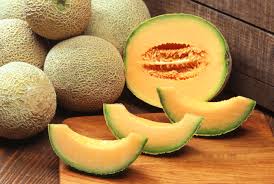Benefits Of Cantaloupes

Cantaloupes are powerful fruits with a lot of nutrients. They have a good source of vitamins A and C, making it an antioxidant dream, and it has folate and potassium. Cantaloupes, also known as muskmelon, can aid to reduce high blood pressure and blood cholesterol levels. They aid to fight against cancer and heart disease, improve the immune system, aid liver health and guard against macular degeneration. Cantaloupes have anti-inflammatory and anti-tumor properties.
Cantaloupe is in the melon family. The outside of the cantaloupe has a rough texture, with a light brown exterior. The inside of the cantaloupe is yellow or bright orange. The cantaloupe is related to the honey dew melon as well as the watermelon. A ripe cantaloupe will have a sweet taste and a light texture. When seeking information on how many calories are in cantaloupe, you will need the size of a serving as well.
How Many Calories Are In A Cantaloupe
When it comes to how many calories in a cantaloupe, you are probably not going to need to worry about the fruit as a whole. The reason being is that it is not the kind of fruit that you can generally hold in your hand like an apple or an orange. Some cantaloupes can be as 11 lbs in weight! So although we will display the calories in a whole cantaloupe here, we will also use the kind of serving sizes that you are more likely going to be using.
* Calories in a whole cantaloupe weighing 1 lb and 3.5 oz there are 188 calories in the edible fruit parts.
* In a 5.5 oz cup of cantaloupe chunks there are 53 calories
* In a 2.4 oz wedge of cantaloupe (4 oz with the rind) there are just 23 calories
As you can see there really are very few calories found in the cantaloupe fruit. This will undoubtedly give the green light to anybody who likes to count their calories, who may be asking are cantaloupes good for you.
To put this into perspective, 2.4 oz of apple has 33 calories in
Nutrients In Cantaloupes. Main nutrients in cantaloupe include vitamin E, vitamin B, pantothenic acid, vitamin B3, vitamin B2, vitamin B1, manganese, copper, zinc, sucrose, glucose, fructose, sodium, phosphorus, magnesium, iron, calcium, potassium, vitamin C, fiber, folate and small amounts of lipids. Cantaloupes contain more beta-carotene than any other type of melon. Key phytochemicals include phytosterols, flavonoids, myristic acid, cucurbitacin B and E, tocopherols, pectin, beta-ionone, beta-carotene, and alpha- carotene.
Health Benefits Of Cantaloupes
Eye Health: Carotenoids are also beneficial for maintaining healthy eyes. It is associated with a reduced risk of cataracts and macular degeneration, as is the vitamin-C content of cantaloupes.
Stress and Anxiety: Potassium is one of the essential nutrients found in cantaloupes, and it has been connected to being a vasodilator, which means that it relaxes the blood vessels and reduces blood pressure. Excited levels of blood pressure can act as a stressor on the body, and can even induce the release of stress hormones like cortisol. Potassium also increases the flow of blood and oxygen to the brain, which induces a calming sensation and a more relaxed attitude. Plus, reducing the presence of stress hormones in the body can seriously reduce symptoms of anxiety.
Diabetes: Although human testing is not as widespread as it should be, early studies show cantaloupe to be connected with improved insulin metabolism, which means a more stable fluctuation of blood sugar, preventing the dangerous spikes and plunges of blood sugar all that diabetics fear. It has also been shown to reduce oxidative stress on the kidneys, which can prevent a number of kidney-related diseases.
Arthritis: The phytochemicals that we spoke about earlier also have anti-inflammatory qualities. This means that having a proper amount of cantaloupe in your diet can help prevent oxidative stress on your joints and bones, thereby reducing inflammation. Chronic inflammation of these vital areas can lead to conditions like arthritis, so make sure to add plenty of cantaloupe to your diet if you’re feeling creaky around the joints.
Cancer Prevention: Cantaloupes are rich sources of beneficial nutrients, including beta-Carotene, an essential carotenoid that the body requires. It is not only a precursor to vitamin-A, which we will discuss shortly, but it also has been shown to act as a powerful antioxidant. It has been linked to reduced chances of a number of different types of cancer, and the phytochemicals present in fresh fruit like cantaloupes have also been linked to anti-tumor behavior. Overall, the nutritional content of cantaloupes is a powerful tool in the prevention of cancer and the eradication of free radicals, the harmful byproducts of cell metabolism that can lead to a number of dangerous conditions, including heart disease and cancer.
Immune System Booster: Cantaloupes not only have the beta-carotene and phytochemicals working in its favor against free radicals, but also a healthy dose of vitamin-C. Vitamin C similarly scavenges disease-causing free radicals and act as an important line of defense for a healthy immune system. Also, vitamin-C stimulates the production of white blood cells, which seek out and destroy dangerous bacteria, viruses, and other toxic substances of foreign bodies that may have found their way into our bloodstream. Cantaloupes are extremely powerful boosters for the immune system for these reasons and more.
Healthy Skin: Cantaloupes are wonderful places to find beta-carotene, which is the precursor to vitamin-A. The best part about dietary beta-carotene, instead of supplements, is that there is no chance for overdose or vitamin-A toxicity, because the body only converts as much as it needs; the rest remains as beta-carotene to fight diseases as antioxidants. But the amount that turns into vitamin-A enters the skin and stimulates the membrane of skin cells and increasing regrowth and repair. This protects that membrane into the body against harmful toxins that prematurely age the skin. Vitamin-A cream is also used as a salve for irritation and redness on the skin, due to its naturally soothing qualities.
Smooth Cantaloupe
Simple recipe.
1/2 (Larger) Cantaloupe
1 Head Romaine Lettuce
If you want something more precise.
(3 cups chopped) Cantaloupe= 12 ounces juice
(2 and 1/2 cups chopped) Romaine Lettuce= 4 ounces juice
Yields 16 ounces of juice.
This is a simple, yet tasty treat. Not only does it taste like a fruit juice, you get an entire head of romaine lettuce into your body. A very easy way to make a cantaloupe juice cleanse recipe for sure
